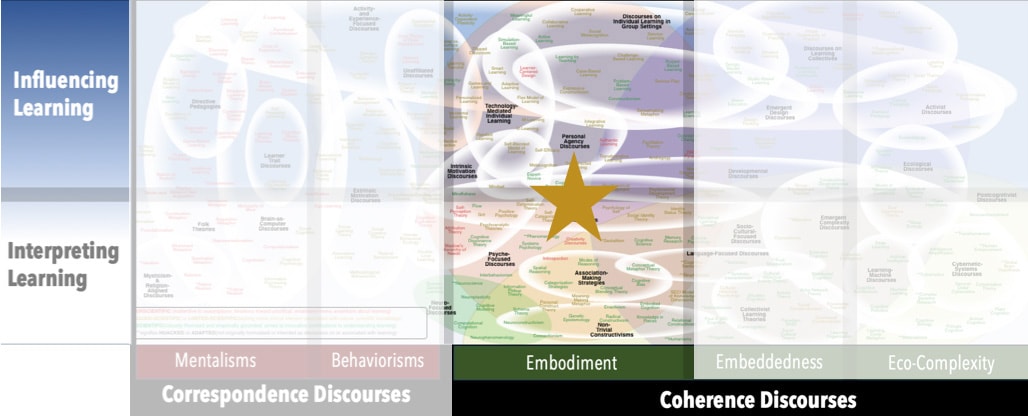Focus
Pursuing what holds greatest value in lifePrincipal Metaphors
- Knowledge is … functioning
- Knowing is … flourishing
- Learner is … feeling-driven agent
- Learning is … meaning-making
- Teaching is … orienting
Originated
1990sSynopsis
Positive Psychology is the scientific study of “the good life” – phrased variously as “flourishing,” “happiness,” “positivity,” “well-being,” “positive functioning,” “quality of life,” “meaningful life,” “well-lived and fulfilling life,” “life worth living,” and “what holds greatest value in life.” It is sometimes described as a reaction to Psychoanalytic Theories and Behaviorisms, which are seen as negative, focused on maladaptive behavior, and driven by the past. In contrast, Positive Psychology looks to the future as it focuses on such qualities as positive emotions, engagement, relationships, meaning, purpose, and accomplishments across biological, psychological, social, institutional, cultural, and ecological domains. Prominent subdiscourses include:
- Appreciative Learning (David Cooperrider & Diana Whitney, 2000s) – invoking two meanings of “appreciation” – as both awareness of positive value and growth in worth – Appreciative Learning emphasizes both quiet recognition of and active efforts to strengthen one's objects of appreciation.
- Benefit Finding (Benefit Finding and Growth; BFG) – the emergence of (and/or quest for) positive outcomes to adverse events
- Grit – (Angela Duckworth, 2000s) – both a personality trait and a psychological discourse, the notion describes long-term determination, motivation, and focus
- Hope Theory (Rick Snyder, 1990s) – an effort to identify, understand, and affect the components of hope that relies heavily on the Path-Following Metaphor. Three are identified: Goals; Pathways Thinking (capacity to plan); Agency Thinking (self-confidence)
- Positive Education (Positive Learning) (Jie-Qi Chen, 2010s) – a student-centered, well-being focused approach to formal education
- Positive Youth Development (William Damon, 2000s) – a prosocial, community-based program aimed at supporting individual strengths, healthy relationships, and leadership skills
- Prospective Psychology (Martin Seligman, 2000s) – the study of “prospection” – that is, how humans anticipate and evaluate possible futures
- Quiet Ego (Heidi Wayment, Jack Bauer, 2000s) – a psychological construct that describes a way of being where the ego is present but not dominant – characterized by humility, compassion, and balance between self and others. It contrasts with both inflated self-focus (narcissism) and self-negation.
Commentary
Some see Positive Psychology as naïve, and perhaps even deliberately ignorant, in its decision to turn away from the darker side of humanity. A few commentators claim to have evidence that questing only for the positive can distort one’s reality and stunt emotional growth and critical thinking. Others have asserted that a future-focus can be damaging to those who need to deal with crushing issues from the past. Constructs associated with such criticisms include:- Toxic Positivity (Positive Toxicity) – the deliberate-but-dysfunctional disregard or silencing of negative emotions, often associated with a conviction that such emotions are better ignored or suppressed
Authors and/or Prominent Influences
Martin Seligman; Mihaly Csikszentmihalyi; Christopher Peterson; Barbara FredricksonStatus as a Theory of Learning
Positive Psychology can be construed as a theory of learning, as it is concerned with structuring one’s being in positive, productive, possibility-oriented ways.Status as a Theory of Teaching
Positive Psychology says very little about teaching – beyond the advice or orienting learners to future possibilities.Status as a Scientific Theory
Proponents assert that there is a substantial body of evidence to support Positive Psychology, and critics claim there’s substantial evidence to demonstrate its shortcomings. Both appear to be justified.Subdiscourses:
- Appreciative Learning
- Benefit Finding (Benefit Finding and Growth; BFG)
- Grit
- Hope Theory
- Positive Education (Positive Learning)
- Positive Youth Development
- Prospective Psychology
- Quiet Ego
- Toxic Positivity (Positive Toxicity)
Map Location

Please cite this article as:
Davis, B., & Francis, K. (2025). “Positive Psychology” in Discourses on Learning in Education. https://learningdiscourses.com.
⇦ Back to Map
⇦ Back to List
